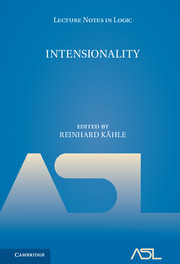Book contents
- Frontmatter
- Preface
- Contents
- The modal aether
- Possible worlds semantics for predicates
- A context principle
- The semantics of modal predicate logic II. Modal individuals revisited
- Intensionality and coercion
- Intensionality in philosophy andmetamathematics
- Representation theorem for models of dynamic intensional logic
- Intension, intention
- Modality, mood, and descriptions
- Coercion vs. indeterminacy in opaque verbs
- References
The modal aether
Published online by Cambridge University Press: 30 March 2017
- Frontmatter
- Preface
- Contents
- The modal aether
- Possible worlds semantics for predicates
- A context principle
- The semantics of modal predicate logic II. Modal individuals revisited
- Intensionality and coercion
- Intensionality in philosophy andmetamathematics
- Representation theorem for models of dynamic intensional logic
- Intension, intention
- Modality, mood, and descriptions
- Coercion vs. indeterminacy in opaque verbs
- References
Summary
This essay owes its appearance here to the good offices of Reinhard Kahle who, at short notice, allowed me the opportunity to turn into something publishable a rat's nest of clandestine fragments hitherto available only to the author's friends and students. I had always assumed that they were in any case so heretical that nobody would publish them even if I tidied them up and I am grateful to Kahle for giving me the chance to be burnt rather than merely ignored. The one major regret I now have about the delay caused by my timidity is that in the dozen-or-so years that have passed since the first draughts of this essay were circulated David Lewis has died. Readers familiar with the literature will immediately recognise Lewis as the most important single creator of the Augean stables I am reporting on, and as the writer most likely to wish to maintain them intact as a World Heritage Site. It is true that I thought his ideas terrible, but he defended them with personal integrity and without malice: I enjoyed his company, and am sorry that he is not around to reply.
The three essays out of which it grew were entitled “The modal ather”, “Indexicality” and “The closest possible world”. In the first essay I argue that if possible worlds are to be used at all to explain necessary truth, then at least some truths (those concerning relations between worlds) are necessary in virtue of something other than truth in all those worlds. In the second I argue that the idea that actuality as indexical is in need of a lot of explanation. In the third I argue that there is no logical notion of closest possible world. The essays get progressively more technical, but I preface themwith an introductory essay whose general drift can be caught even by those with no formal background, and insert between the first and second essays a brief sketch of the topological ideas on which ideas of indexicality and proximity (of the two final essays) presumably ultimately rely.
- Type
- Chapter
- Information
- Intensionality , pp. 1 - 19Publisher: Cambridge University PressPrint publication year: 2005

